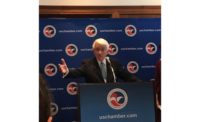With several proposals on the table but no Capitol Hill consensus yet about a revenue source for a new long-term surface transportation bill, the American Road & Transportation Builders Association has put forward another idea: a sharp increase in federal motor-fuels taxes.
The ARTBA plan, announced on March 12, calls for a 15¢-per-gal. boost in the gasoline and diesel tax, but it also has an unusual wrinkle—a $90 a year rebate to motorists to offset the fuel-tax hike’s impact on their pocketbooks.
The federal gas tax now is 18.4¢ and the diesel levy is 24.4¢; those rates took effect in October 1993.
A tax hike is likely to be a tough sell in the Republican-controlled Congress. For example, House Ways and Means Committee Chairman Paul Ryan (R-Wis.) in January ruled out a gas-tax increase. A Ways and Means spokesman told ENR via email that Ryan’s position “has not changed."
Pete Ruane, ARTBA president and CEO, told reporters in a conference call that his group has had “numerous discussions with Senators, House members [and] senior staff on all the key committees…and we found that they are quite interested in this idea, and very open-minded.” He adds, “I think that we’re very encouraged by the reception we got to this idea over the last few days.”
The search for revenue is becoming more urgent. The current short-term highway and transit authorization statute expires on May 31, and though House and Senate committees are drafting bills to succeed the stopgap, the revenue to fund those measures continues to be the missing link.
In outlining the ARTBA "Getting Beyond Gridlock" proposal, Ruane said, “The whole idea was to show the Congress, show the key leaders that there’s a way of dealing with this problem.”
He notes, “There’s precedent for a rebate. They’ve done it before. It’s easy to do and it allows them to move forward with a very robust bill.”
Another issue is that the Highway Trust Fund’s highway account is still on shaky ground and will need some new revenue to avoid tumbling into a deficit position later this year. Ruane notes that the ARTBA plan helps on that score. He says, “At the end of the six years, the trust fund is still there. It’s not insolvent.”
The Obama administration and some lawmakers have floated other transportation funding proposals that center on repatriating, and taxing, U.S. companies' overseas income. But Ruane notes that those ideas would provide only one-time, or six-year, infusions for the trust fund and after that period, “You’ve got the same bloody problem.”
Ruane says ARTBA also has discussed the plan with transportation, construction and other groups, and the reaction has been “nothing but huzzahs.” He adds, “It’s seen as a way to further the discussions, further the debate.”
Brian Turmail, an Associated General Contractors of America spokesman, says, “Any option that identifies real and realizable sources of revenue to address the Highway Trust Fund shortfall ought to be on the table, ought to be part of the conversation.”
Pam Whitted, National Stone, Sand & Gravel Association senior vice president for government and regulatory affairs, says, “It’s an interesting proposal. We want to take a look at it.”
ARTBA estimates that the fuel-tax increase would raise $159.2 billion over six years. When added to the trust fund’s currently projected inflow the grand total would be $400.9 billion for the new transportation bill.
The rebate would apply to individual taxpayers with adjusted gross incomes of $100,000 a year and joint filers with income of up to $200,000. Truckers and others who pay the higher diesel taxes would not be eligible for rebates.
ARTBA says that the rebates would cost the Treasury $103.3 billion over six years, which would have to be offset by other revenue raisers to keep the plan revenue-neutral. ARTBA suggests repatriation as one possible offset.
Some in Congress have proposed gas tax increases and the U.S. Chamber of Commerce has backed that concept, too.



Post a comment to this article
Report Abusive Comment